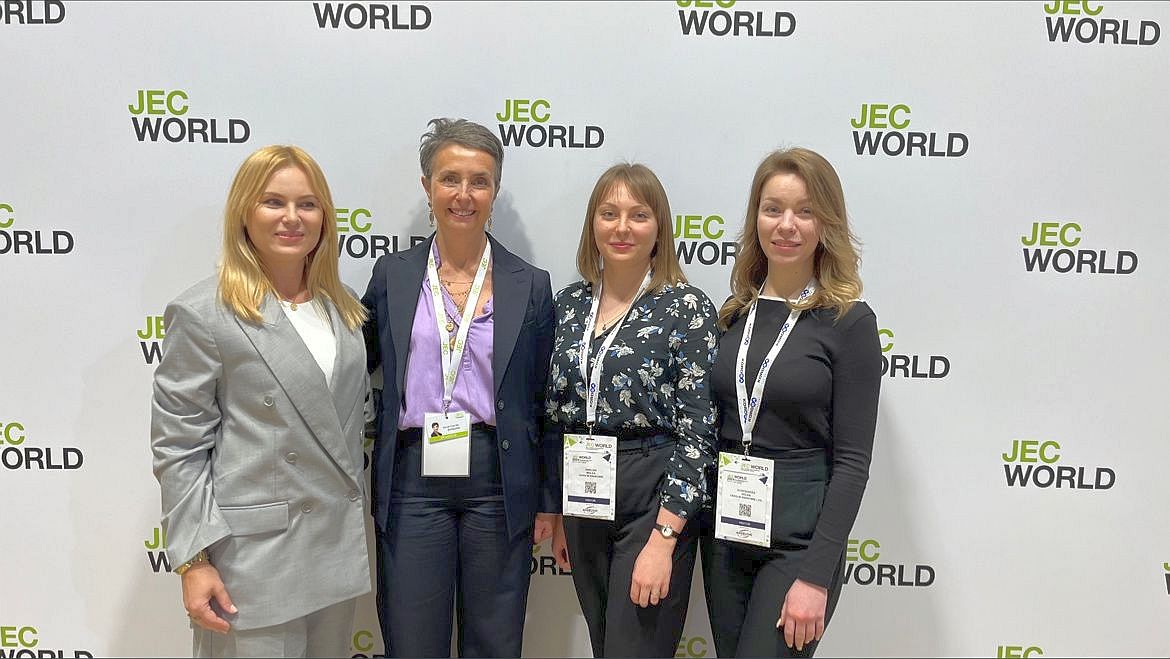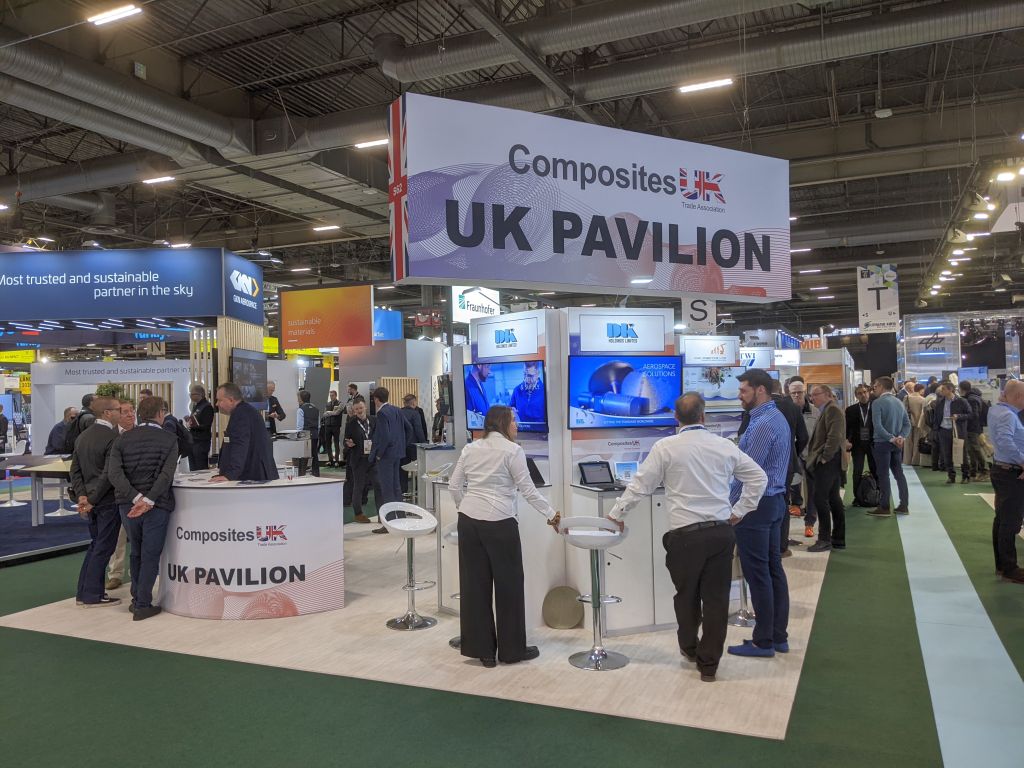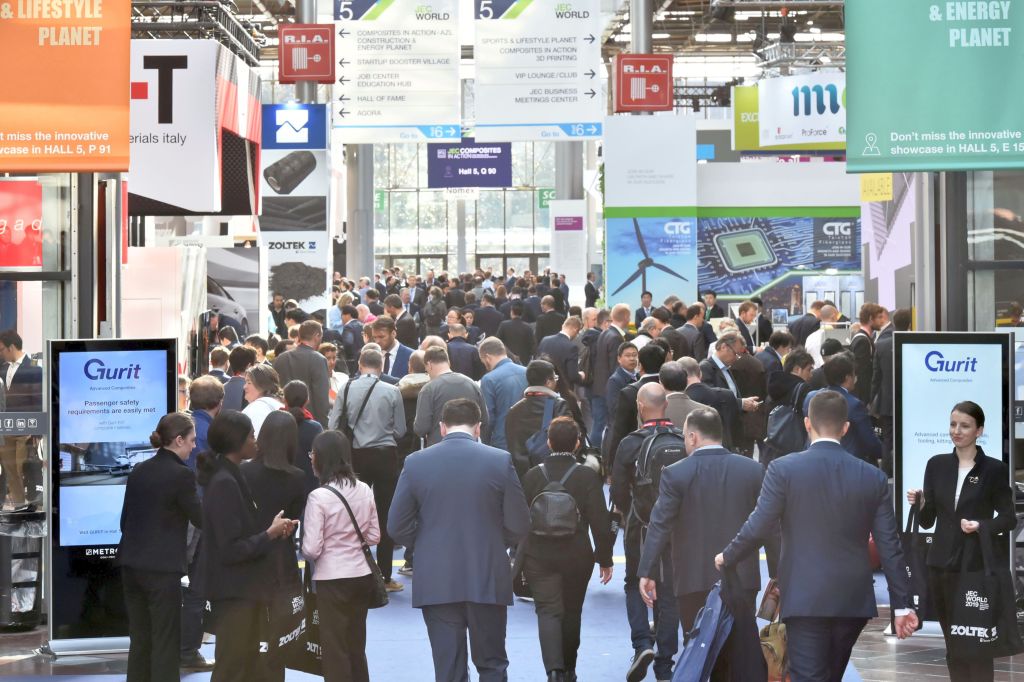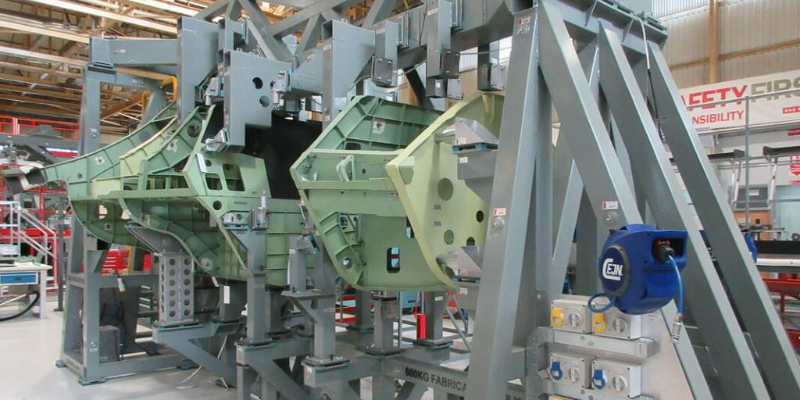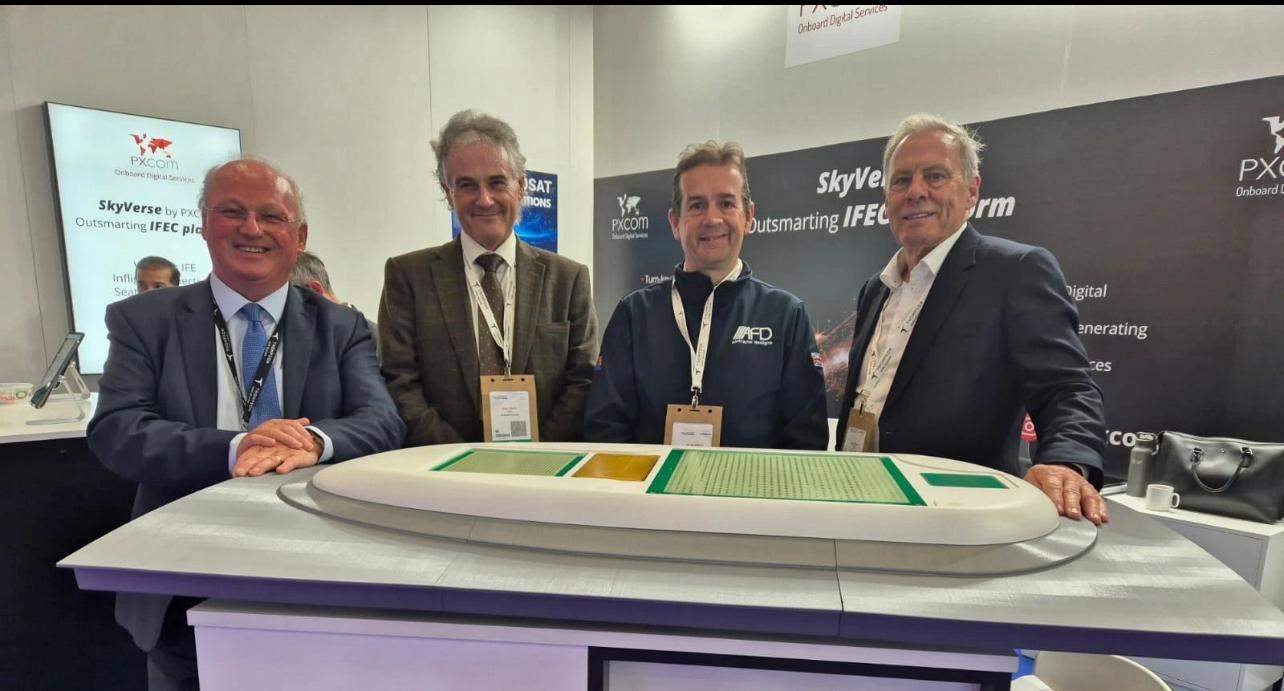
JEC World - Let the show commence
18th Apr 2023 | In News | By Mike Richardson
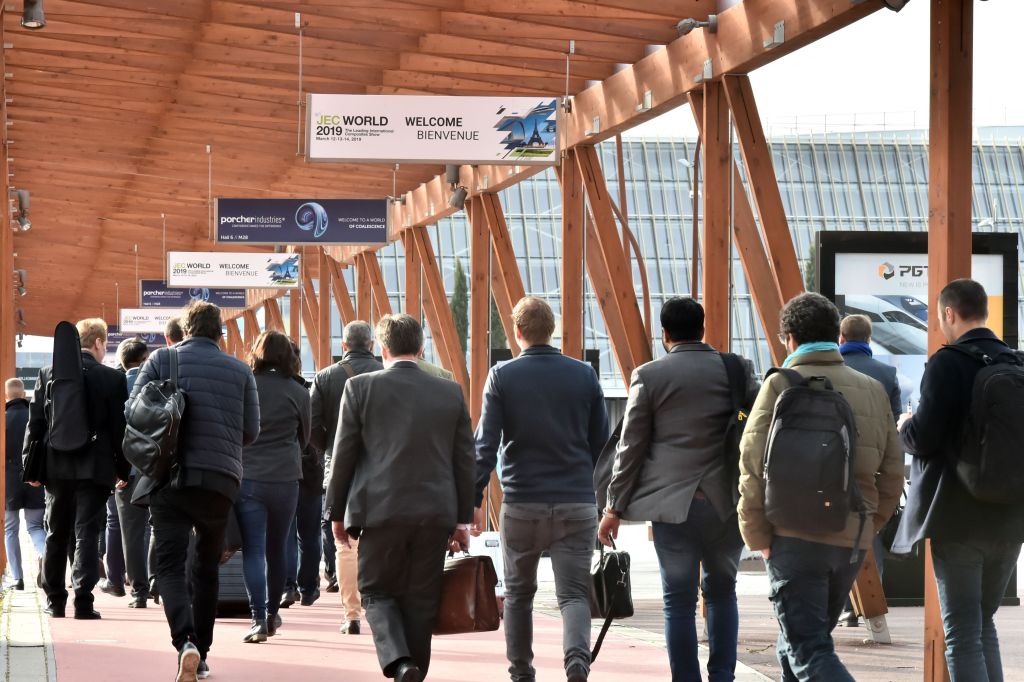
JEC World attracts exhibitors from around the world. Aerospace Manufacturing previews some of the companies that will be showcasing their latest products and innovations during the show.
We begin our exhibitor round-up with Anaglyph (hall 6, stand R40). The company will demonstrate the latest version of its hand-layup ply placement technology PlyMatch. PlyMatch uses augmented reality to show the live combined images of actual and target ply outlines and fibre orientation details on a monitor, so that the two can be matched by the operator. PlyMatch is used for the accurate placement of plies in hand lay-up manufacture of composite parts, as well as for monitoring and validation of automated methods.
Moving on, Ascent Aerospace (hall 5, stand P6) the leading, single-source provider of turnkey production and automated assembly systems for the aerospace, defence, and space industries offers a variety of products and solutions to resolve challenging aerostructure assembly requirements, from wing components and fuselage structures to final assembly lines. Ascent produces a full suite of composite tooling, including layup moulds, mandrels, bond tools, and trim and drill fixtures, including the largest Invar moulds ever made for aerospace. Ascent can also evaluate the use of 3D printed jigs and fixtures as part of sub-assembly and final assembly processes and print them in-house. In addition, Ascent offers automated, drilling and fastening systems, having installed more than 2,200 systems globally. As an assembly line integrator, Ascent works with airframers to develop their project and see it through from process design and engineering through build and installation, to ensure it is an efficient and cost-effective solution.
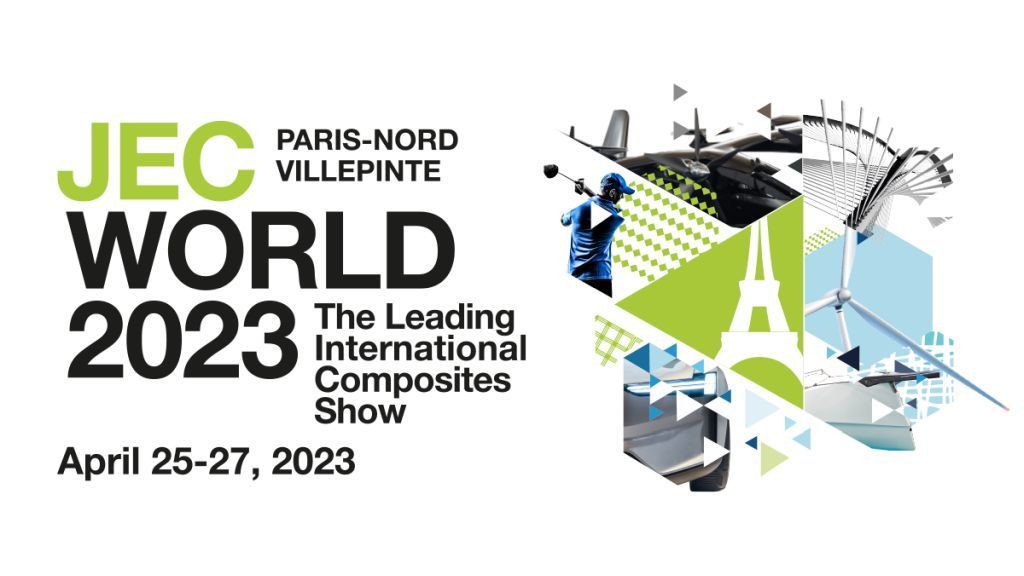
At JEC, CGTech (hall 5, stand F13) will demonstrate how advanced programming strategies and simulation can lead to the production of better composite parts. Throughout the show, the company will showcase VERICUT Composite Programming (VCP) and VERICUT Composite Simulation (VCS), as well as its VERICUT CNC simulation, verification and optimisation software.
VERICUT Composites Applications stands separately from VERICUT, CGTech’s simulation, verification, and optimisation software. VCP reads CAD surfaces and ply boundary information and adds material to fill the plies according to user-specified manufacturing standards and requirements. These layup paths are linked together to form specific layup sequences and output as NC programs for automated layup machines.
VCS simulates work environments for automated composites manufacturing, simulating the sequence of NC programs on a virtual machine, including head changes, probing, knife cutting, and more. The simulated material applied to the virtual form can be measured and inspected for stack thickness, ply offset, ply angle, and other specifications to ensure the NC program follows manufacturing standards and requirements.
The latest version, 9.3, of VCP and VCS both feature improvements to simulation graphics and ease of use, such as adjusting the rendering of form edges, importing form surfaces, creating and saving custom views, and more. Improvements have also been made to algorithms such as form offset linking, advanced path generation, and advanced rosette systems.
CGTech will also exhibit its latest version of VERICUT software. Version 9.3 is the latest release of VERICUT, an industry leading independent CNC machine simulation, verification and optimisation software platform that enables users to eliminate the process of manually proving-out NC programs.
Compcut (hall 6, stand R73), Sharp & Tappin’s specialist division designing and manufacturing composite cutting and machining solutions, is improving its services to the European market by teaming up with partner, Aptco Technologies. The European-based developer, manufacturer and worldwide supplier of sample preparation and testing equipment for labs, will now actively promote, sell and technically support the latest Compcut composite cutting machines used primarily for the preparation of consistently accurate composite test samples.
This European partnership with Aptco Technologies will allow more companies and organisations to produce critical composite test samples using Compcut machines as they join many composite engineers who now realise that this solution is safer, easier, quicker, cleaner, cost-effective, and more consistent.
Don't miss the opportunity to visit Creaform (hall 5, stand M 79) at JEC World and discover its latest 3D scanning solutions. The company will showcase its cutting-edge technologies, including the MetraSCAN 3D scanner and the new HandySCAN BLACK|Elite Limited, both ideal to improve product quality, increase efficiency, and gain a competitive advantage in the aerospace industry.
Widely adopted by the aerospace industry for their high level of accuracy, portability, and ease of use, these two scanners perform repeatable metrology-grade measurements of complex parts and components in any environment. Operated without the need for rigid measurement setup, these solutions can significantly reduce scanning time, making it an essential tool for the aerospace manufacturing industry, whether for commercial, general, or military.
The MetraSCAN 3D is a fast and accurate 3D scanner and portable CMM that can be used in all segments of the aerospace industry. It is specifically designed for manufacturing and metrology professionals who do not want to compromise on quality or efficiency. The HandySCAN BLACK|Elite Limited can provide an accuracy of 0.012mm, through optimised manufacturing and calibration processes. It is designed to tackle any quality control or product development applications where tolerances require increased accuracy. Portable, lightweight, simple and versatile it is perfect for inspecting aircraft components, tooling, and fixtures.
Elsewhere, Huntsman’s (hall 6, stand M31) legacy in aerospace spans more than 70 years and the company will be showcasing products and technologies at JEC World. Its EPOCAST epoxy void fillers offer solutions for edge sealing, insert potting, and honeycomb assembly, reinforcement, and repair. The EPOCAST portfolio includes new products, such as the REACH-compliant and EHS-friendly EPOCAST 1630 edge and void filler. This new product is abradable, offers good flow at processing temperature and a flexible curing speed. EPOCAST 1649-1 edge and void filler is an FST-rated, low-density material that increases productivity by up to 50%, while reducing material costs by up to 30% for core reinforcement applications. EPOCAST 1635 edge and void filler is designed for refilling mis-drilled holes in composite parts. EPOCAST 1614-A2 one-part, frozen edge and void filler offers up to 100% longer shelf life compared to competitive products and does not contain any substance of very high concern as defined under REACH.
Next up is JETCAM (hall 6, stand S52), a manufacturer and supplier of CADCAM, nesting, and industry 4.0 IoT software. JEC presents an opportunity to experience the array of software that JETCAM provides to composite manufacturers, including nesting, material location/life/consumption tracking, and automation software. JETCAM Expert is a leading nesting and automation software. CrossTrack runs alongside JETCAM Expert and is designed to be fully interactive within ERP, MES, and other shopfloor technologies, such as automated freezers or kitting robots for turnkey automation. Its latest option includes Ultra Performance Nesting: a feature which allows for progressive nesting of pattern quantity and material efficiency.
Plataine (hall 6, stand H74) will demonstrate how it can help to address labour shortage challenges with its AI and Industrial IoT (IIoT) solutions for composite manufacturing. Plataine’s IIoT and AI solutions for manufacturing allow businesses to transform how they utilise their workforce and materials. Getting the most out of every resource to optimise operations for even the most advanced aerospace composite manufacturing process.
Manufacturing optimisation technology that’s built on AI and IIoT changes the game for the aerospace industry by: Tracking assets and production in real-time; Identifying trends and deviations; Finding inefficiencies and automating repetitive manual tasks; Reducing waste by using the optimal materials including adopting a short rolls strategy; Calculating multiple layers of data in real-time and proactively offering actionable insights and recommendations, hence acting as a force multiplier to the experienced workforce.
At JEC World, Schütz Composites (hall 6, stand D50) will present many different areas of application for its CORMASTER material, which combines high mechanical strength and resistance with light weight, thanks to its honeycomb shape. The material is also resistant to extreme heat and humidity, as well as to corrosion from oil, water and paraffin. The aramid paper-based material is used wherever low weight and maximum stability are required. The modern honeycomb material offers outstanding processability. Whether used as sandwich or engineered panels, milled or formed parts or curved sandwich panels from the autoclave, CORMASTER honeycombs are suitable both for load-bearing structural parts and for high-quality interior design.
Bismaleimide (BMI) composites find use in the aerospace industry in demanding high temperature applications, thanks to elevated thermomechanical performance compared to commonly used epoxy resins. Solvay (hall 5, stand M41) says it has a deep legacy in BMI technology, thanks to products such as CYCOM 5250-4, which have been selected on a range of platforms. Research scientists at Solvay continue to push the envelope of BMI resin performance to serve ever expanding market needs.
A presentation given by Rob Iredale on Wednesday 26th of April, 11:30am - 11:55am, Agora Hall 5 will describe the development and properties of a next-generation system (X-BMI) that brings benefits for high temperature applications.
The key drivers behind the development of X-BMI are advances in thermal stability and processing. This results in a material with a high Tg and continuous service temperature, coupled with enhanced reactivity enabling robust and flexible processing with respect to cure conditions. Furthermore, X-BMI has potential to be processed using out of autoclave techniques. These features are achieved while maintaining the excellent mechanical performance associated with BMI composite materials.
Finally, Zünd (hall 5, stand T41) will present its latest developments in the field of modular, digital cutting solutions. When cutting fibre composites, digitalised data management is key to an efficient cutting process. Zünd PreCut Centre – ZPC optimises cut files automatically and adjusts cut paths according to the material and tools at hand. The integrated nesting function ensures cut parts are automatically nested for maximum material utilisation.
Zünd will also present its Pick&Place interface, an economical solution for automatic picking, sorting, and placing of cut parts. For automated parts removal, the Pick&Place interface communicates directly with a robot via Zünd Cut Centre – ZCC. If the cut parts are to be removed manually, the operator can mark each part with labels containing printed barcodes and job information and, in this process, is visually supported by a projection system. The required parameters are derived from job metadata.
Zünd will showcase its Heat Sealing Module – HSM, a powerful tool for cutting dry fabrics and sealing the edges at the same time. This cutting and sealing process facilitates the handling of cut parts and reduces the need for cleaning the conveyor belt.
Consider a free digital subscription
If you find this article informative, consider subscribing digitally to Aerospace Manufacturing for free. Keep up to date with the latest industry news in your inbox as well as being the first to receive our magazine in digital form.


